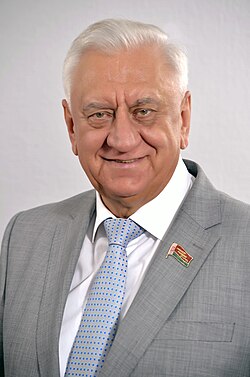Mikhail Myasnikovich | |
|---|---|
| |
 Myasnikovich in 2017 | |
| Chairman of the Board of the Eurasian Economic Commission | |
| In office 1 February 2020 –1 February 2024 | |
| Preceded by | Tigran Sargsyan |
| Succeeded by | Bakhytjan Sagintayev |
| Speaker of the Council of the Republic | |
| In office 16 January 2015 –4 December 2019 | |
| President | Alexander Lukashenko |
| Preceded by | Anatoly Rubinov |
| Succeeded by | Natalia Kochanova |
| 7th Prime Minister of Belarus | |
| In office 28 December 2010 –27 December 2014 | |
| President | Alexander Lukashenko |
| Deputy | Vladimir Semashko |
| Preceded by | Sergei Sidorsky |
| Succeeded by | Andrei Kobyakov |
| Personal details | |
| Born | Mikhail Vladimirovich Myasnikovich 6 May 1950 |
| Party | Independent [ citation needed ] |
| Alma mater | Brest State Technical University |
Mikhail Vladimirovich Myasnikovich [a] (born 6 May 1950) is a Belarusian politician who was Prime Minister of Belarus from 2010 to 2014. He was the Chairman of the Board of the Eurasian Economic Commission from 2020 to 2024.



